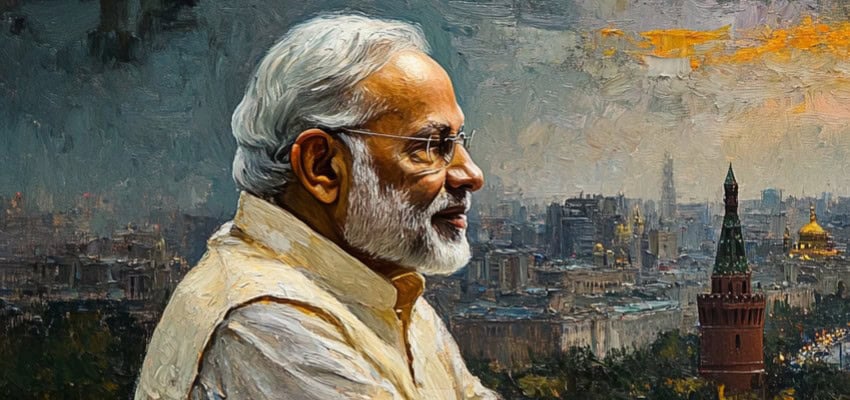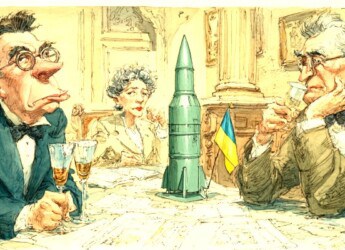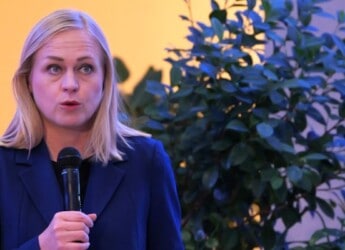Editor’s Note: This report provides an analysis of the ongoing military operations between Ukrainian and Russian forces as of August 23, 2024. The update highlights Ukraine’s continued tactical advancements within Kursk Oblast, the significant role of international military aid, and the strategic implications of recent drone strikes on Russian infrastructure. Additionally, the visit of Indian Prime Minister Narendra Modi to Kyiv marks a pivotal moment in diplomatic relations, potentially signaling a shift in India’s foreign policy towards stronger support for Ukraine. This report offers military and geopolitical analysts detailed insights into the latest developments in the Ukraine-Russia conflict. This concise overview is based on verified facts from the latest Institute for the Study of War report, dated August 23, 2024.
For those seeking to grasp the full scope of this evolving landscape, the complete updates from the Institute for the Study of War serve as an invaluable resource.
Content Assessment: Ukraine's Kursk Advances and Modi's Kyiv Visit: Military and Diplomatic Progress
Information - 94%
Insight - 95%
Relevance - 93%
Objectivity - 94%
Authority - 95%
94%
Excellent
A short percentage-based assessment of the qualitative benefit expressed as a percentage of positive reception of the recent article from ComplexDiscovery OÜ titled, "Ukraine's Kursk Advances and Modi's Kyiv Visit: Military and Diplomatic Progress."
Background Note: ComplexDiscovery’s staff offers distinctive perspectives on the Russo-Ukrainian war and Iran-Israel conflict, informed by military experience on the West German, East German, and Czechoslovakian border during the Cold War and in Sinai as part of Camp David Accord compliance activities. This firsthand regional knowledge has been further enhanced by recent staff travels to Eastern European countries, including Estonia, Latvia, Lithuania, and Poland. These visits have provided up-to-date, on-the-ground insights into the current geopolitical climate in regions directly impacted by the ongoing conflict.
Combined with proficiency in cybersecurity, information governance, and eDiscovery, this multifaceted experience enables comprehensive analysis of these conflicts, including the critical impact of cyber warfare, disinformation, and digital forensics on modern military engagements. This unique background positions ComplexDiscovery to provide valuable insights for conflict-related investigations and litigation, where understanding the interplay of technology, data, and geopolitical factors is crucial.
Russo-Ukrainian Conflict Update*
Ukraine’s Kursk Advances and Modi’s Kyiv Visit: Military and Diplomatic Progress
ComplexDiscovery Staff
On August 23, 2024, Ukrainian forces continued to make incremental progress in their operations near Sudzha, located in Russia’s Kursk Oblast. This region has become a focal point for Ukraine’s broader strategy aimed at creating a buffer zone within Russian territory. The strategic intent behind these operations appears to be the disruption of Russian artillery and missile capabilities, thereby reducing the threat posed to Ukrainian forces and civilians. The U.S. Department of Defense has recognized these operations, with Pentagon Press Secretary Sabrina Singh commenting on the United States’ evolving understanding of Ukraine’s goals in Kursk Oblast. While current U.S. policies limit Ukraine’s use of American-supplied weapons within Russian borders, Ukrainian forces have nonetheless been actively engaging in counterfire operations against Russian positions in the region.
Ukraine’s military leadership, represented by Deputy Defense Minister Ivan Havrylyuk, has consistently emphasized the importance of leveraging tactical and technological advantages to counterbalance Russia’s material superiority. Since the onset of Russia’s full-scale invasion in February 2022, Ukraine claims to have inflicted significant losses on Russian military assets, including the destruction of over 8,500 tanks, 17,000 artillery systems, and numerous aircraft. These accomplishments are largely attributed to Ukraine’s effective deployment of precision Western artillery systems, such as the GMLRS rocket artillery and NATO’s 155mm artillery, which have been critical in Ukraine’s counterbattery fire missions.
Moreover, Ukraine’s increasing reliance on unmanned systems has allowed it to inflict heavy losses on Russian forces while minimizing costs. Havrylyuk noted that the growing use of drones in 2024 has been particularly effective in targeting Russian artillery and armored vehicles. However, he also pointed out that Ukraine’s efforts are constrained by Western-imposed restrictions on military aid and the prohibition on long-range strikes within Russian territory. These limitations have hindered Ukraine’s ability to further degrade Russian material advantages by striking military bases, arsenals, and logistical routes deep within Russia.
In a demonstration of continued international support for Ukraine, U.S. President Joe Biden announced a new military aid package valued at $125 million following a conversation with Ukrainian President Volodymyr Zelensky. This latest package includes a range of critical military supplies, such as counter-unmanned aerial systems (c-UAS), ammunition for High Mobility Artillery Rocket Systems (HIMARS), 155mm and 105mm artillery shells, anti-armor systems like Javelins and AT-4s, as well as medical and mine-clearing equipment. This assistance is aimed at bolstering Ukraine’s defensive capabilities as it continues to confront Russian forces.
In addition to its ground operations, Ukraine has intensified its efforts to target strategic Russian assets using drone strikes. On August 23, Ukrainian forces conducted another drone strike on an oil depot in Proletarsk, Rostov Oblast. This strike followed a similar attack on August 18, which had already caused a significant fire at the depot. Satellite imagery also revealed that a Ukrainian strike on August 22 at the Marinovka airbase in Volgograd Oblast resulted in the destruction of at least one Russian Su-24 or Su-34 fighter aircraft, with additional damage reported to other aircraft parked in hangars. These targeted strikes highlight Ukraine’s ability to inflict damage on critical Russian military infrastructure far from the frontlines.
Domestically, Russia faced a significant internal security challenge on August 23 when Islamic State (IS)-affiliated inmates took hostages at a penal colony in Surovikino, Volgograd Oblast. The attackers, reportedly motivated by a desire for revenge over the treatment of Muslim prisoners in Russia, managed to take several prison employees and fellow inmates hostage, leading to a violent standoff. The incident resulted in the deaths of several hostages and has sparked widespread criticism of Russia’s prison system and migration policies. Russian milbloggers, reflecting public sentiment, have pointed to increasing radicalization within Russian penal colonies as a growing threat, exacerbated by the influx of Central Asian migrants and the mobilization of prisoners to fight in Ukraine.
Amidst these developments, Indian Prime Minister Narendra Modi’s visit to Kyiv on August 23 marked a significant diplomatic event. This visit, the first by an Indian prime minister to Ukraine since the establishment of bilateral relations in 1992, underscores a potential shift in India’s foreign policy. During his visit, Modi reaffirmed India’s commitment to peace in Ukraine, referencing India’s participation in Ukraine’s July 2024 peace summit. He and Ukrainian President Volodymyr Zelensky signed several bilateral cooperation agreements, covering areas such as agriculture, economics, development, and culture. Notably, the two leaders agreed to enhance bilateral defense cooperation, particularly in manufacturing, and to convene a second Joint Ukrainian-Indian Working Group meeting on military-technical cooperation in the near future. Modi’s visit to Ukraine may signal a stronger alignment of India with Western positions in support of Ukraine, despite India’s historically close relationship with Moscow.
The situation on the ground in Ukraine remains fluid, with Ukrainian forces making targeted advances and receiving continued support from international allies. Meanwhile, Russia is grappling with both external military pressures and internal security challenges, reflecting the broader complexities of the ongoing conflict.
News Sources
As a leading source for cybersecurity, information governance, and legal discovery insights, including international investigations and litigation, ComplexDiscovery OÜ recognizes the importance of awareness regarding alleged and documented criminal acts, particularly in the context of the Russia-Ukraine conflict. While we, following the lead of the Institute for the Study of War (ISW), do not provide detailed coverage of war crimes in our primary reports, we encourage professionals within the eDiscovery ecosystem to stay informed about these activities. This awareness is crucial for understanding potential future legal actions and responsibilities.
Detailed Reporting with Maps for August 23, 2024, from the ISW – Mouseover to Scroll
Ukraine and Russian Campaign Assessment - 082324Review the Detailed Reporting and Maps PDF
About the Institute for the Study of War Research Methodology
ISW’s research methodology relies on both primary and secondary sources, enabling researchers to develop a comprehensive understanding of the situation on the ground. In order to analyze military and political developments in any given area, ISW’s research analysts must wholly understand the systems of enemy and friendly forces. They must also understand the population demographics, physical terrain, politics, and history of that area. This lays the analytical foundation for understanding the reasons for particular developments and fulfilling their assigned research objectives. ISW analysts also spend time in places like Iraq, Afghanistan, and elsewhere in order to gain a better understanding of the security and political situation and to evaluate the implementation of current strategies and policies. Our researchers compile data and analyze trends, producing a granular analysis of developments in areas of research, producing an accurate, high-resolution, timely, and thorough picture of the situation. ISW’s research methodology guarantees its success and commitment to improving the nation’s ability to execute military operations, achieve strategic objectives, and respond to emerging problems that may require the use of American military power.
About the Institute for the Study of War
The Institute for the Study of War advances an informed understanding of military affairs through reliable research, trusted analysis, and innovative education. They are committed to improving the nation’s ability to execute military operations and respond to emerging threats in order to achieve U.S. strategic objectives. ISW is a non-partisan, non-profit, public policy research organization.
Learn more, get involved, and contribute today.
Additional Reading
- From Dissent to OSINT? Understanding, Influencing, and Protecting Roles, Reputation, and Revenue
- [Annual Update] International Cyber Law in Practice: Interactive Toolkit
- Data Embassies: Sovereignty, Security, and Continuity for Nation-States
Assisted by GAI and LLM Technologies
* Sourced and shared with direct express permission from the Institute for the Study of War (ISW).
Source: ComplexDiscovery OÜ



























